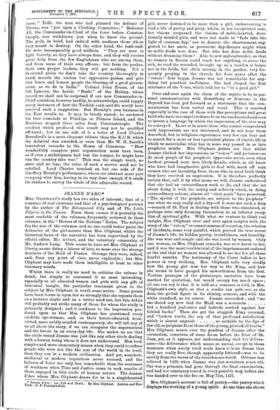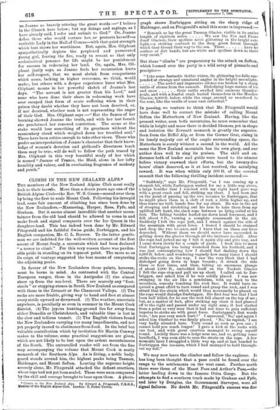JEANNE D'ARC.*
MRs. OLIPHANT'S study has two sides of interest ; that of a romance of real existence and that of a psychological portrait by the author of The Beleaguered City and of The Little Pilgrim in the Unseen. From these causes it is probably the most readable of the volumes, frequently reviewed in these columns, in the "Heroes of the Nations" Series. The subject fits the size of the volumes, and no one could better paint the delicacies of the girl-nature than Mrs. Oliphant, whilst the historical basis of the narrative has been supervised by the official editor, Mr. Abbott, and the voluntary censorship of Mr. Andrew Lang. This seems to have set Mrs. Oliphant at liberty, as one doing a labour of love, to muse over the strange destinies of the Maid of France. Strange they were, indeed, and, from any point of view, never explicable ; but Mrs. Oliphant may have made them intelligible at least to other visionary minds.
Whilst there is really no need to criticise the volume in detail, but simply to commend it as most interesting, especially to all educated women and girls with any gift of historical insight, the particular treatment given to the snbject by Mrs. Oliphant is worth some notice. Some points have been borne in upon her so strongly that she repeats them as a lecturer might and as a writer need not, but this defect will probably not strike many of those for whom the study is primarily designed; and it conduces to the impression pro- duced upon us that Mrs. Oliphant has questioned every credible eye-witness, and, as their better-educated, keen- witted, more subtly-minded contemporary, she will tell any of us all about the story, if we can recognise the supernatural and the heroic in an every-day life. She makes us see that the circle round Jeanne was just like any other circle dealing with a human being whom it does not understand. Men took simpler and more elementary means when they could to reduce people who were not like the rest of the world to its level, than they can in a modern civilisation. And yet, somehow, medimval or modern inquisitors never succeed, and the failures of force are only less remarkable than the successes of weakness when Time and Justice come to seek results of those engaged in this strife of human nature. The Jeanne d'Arc whom Mrs. Oliphant draws for us is a singlehearted
• Jeanne eVAre : her Life and Death. By Mrs. Oliphant. London and New York : G. P. Pntnam'e Bone,
girl, never destined to be more than a girl, endeavouring to lead a life of purity and piety, whilst, in her exceptional case, her visions surpassed the visions of noble-hearted, devo- tionally minded girls, and were not made to "fade into the light of common day," nor to deserve the chastisement sug- gested to her uncle, as persistent day-dreams might when no noble deeds were done. But who has done noble deeds without dreaming them P Able to sew and embroider, so that no woman in Rouen could teach her anything, to nurse the sick, to tend the wounded, brought up as a maiden at home, not in the fields, but often miming in the garden, very fre- quently praying in the church, for four years after the " voicea " first began, Jeanne was not remarkable for any- thing but practical usefulness. She had obeyed the first utterance of the Voice, which told her to "be a good girl."
Over and over again the claim of the mystic to be in per- sonal communication with Something or Someone in the Beyond has been put forward as a statement that the com- munication has been verbal and vocal. This is asserted especially in the case of those with fine perceptions and great faith who have to compel credence from the uneducated and even to invent a language by which the impression of the Beer may be conveyed. In art or in music those who cannot comprehend such impressions are not interested, and do not hear them described, but in religious experiences very few can bear not to search for a more or less equivalent phrase of visible life in which to materialise what has in some way passed in or into prophetic minds. Mrs. Oliphant points out that whilst Jeanne clothed her impressions as " voices " and pictures—as do most people of the prophetic type—she never, even when hardest pressed, went into likely details, which, as all know who have had imaginative girls to deal with, mark off vain women who are inventing from those who in good faith think they have received an impression. It is therefore perfectly certain that, call it by what name we will, Jeanne understood that she had an extraordinary work to do, and that she set about doing it with the sanity and sobriety which, in doing extraordinary actions, almost all "elect souls" have preserved. "The spirits of the prophets are subject to the prophets" was what we may really call a dry—if it were not such a deep —remark of St. Paul in dealing with those who simulated, or perhaps were only dooming themselves to an inferior recep- tion of, spiritual gifts. With what we venture to think real insight, Mrs. Oliphant over and over again couples with the story of the "voices," or consciousness of vocation, the relation of incidents, some very painful, which proved the true secret of Jeanne's life, its hidden purity, truthfulness, and humility. She was wise and simple and she was loved by women. Only one woman, as Mrs. Oliphant remarks, was ever harsh to her, and it was the most terrible trial of the imprisonment endured at the end that no woman was allowed to see her for all those fearful months. The testimony of the Court ladies to her powers is very striking. Mrs. Oliphant tells very vividly how the young girl won her way to the King, and how she seems to have ganged his unworthiness from the first. Various passages of the picturesque narrative have been marked for quotation, but would occupy too much space ; all one can say is that it is told as a romance is told, in Mrs. Oliphant's own style, so that a reader can quite see, as she does, the girlish figure in its shining armour, and with the white standard, as its centre. Jeanne succeeded ; and "no
one dared say now that the Maid was a sorceress but a hundred jealousies and hatreds worked against her behind backs." Then she got the sluggish King crowned, and "broken words, the cry of that profound satisfaction
which is almost anguish so suitable to the lips of the old, so poignant from those of the young, pierced all hearts." Mrs. Oliphant muses over the position of Jeanne after the coronation, conscious of some doom before the feast of St. Jean, yet, as it appears, not understanding that her deliver- ance—the deliverance which seems so unreal, except in those moments when sorely tried souls know it is no dream that they are really free, though apparently fettered—was to be merely from the waves of the troublesome world. Orleans was relieved in 1429, when Jeanne was just seventeen years old. She was a prisoner, had gone through the final examination, and had her constancy tested in every possible way, before she was handed over to the fire on May 31st, 1431.
Mrs. Oliphant's account is full of poetry,—the poetry which displays the working of a young spirit. At one time she shows
us Jeanne so bravely uttering the great words :—" I believe In the Church here below ; but my doings and sayings, as I have already said, I refer and submit to God." Or, Jeanne defies those who would torture her, or protects herself—a veritable Lady in the Hall of Comus—with that quiet strength which best shows her worthiness. Bat, again, Mrs. Oliphant sympathetically -depicts the perplexed and persecuted young girl, fearing the fire, ready to recant so that only ecclesiastical penance for life might be her punishment for success in redeeming her land. Or, again, Mrs. Oli- phant justly says, as Jeanne feels her recantation hurts her self-respect, that we must shrink from comparisons which some, lacking in higher reverence, we think, would make ; but others with a deeper experience know what Mrs. Oliphant means in her powerful sketch of Jeanne's last days. "The servant is not greater than his Lord," and none who have done their share in redeeming work have ever escaped that form of acute suffering when in their prison they doubt whether they have not been deceived, or, if not deceived, whether man is not representing the anger of their God. Mrs. Oliphant says :—" But the flames of her burning showed Jeanne the truth, and with her last breath she proclaimed her renewed conviction. The scene at the stake would lose something of its greatness without the momentary aloud which weighed down her troubled soul." There have been critics enough to take other views. Those who prefer an interpretation of Jeanne's character that their know- ledge of woman's devotion and girlhood's directness teach them may be true, will do well to follow the path traced by Mrs. Oliphant in this very beautiful study of her which is named "Jeanne of France, the Maid, alone in her lofty humility and valour, and in everlasting fragrance of modesty and youth."



















































 Previous page
Previous page